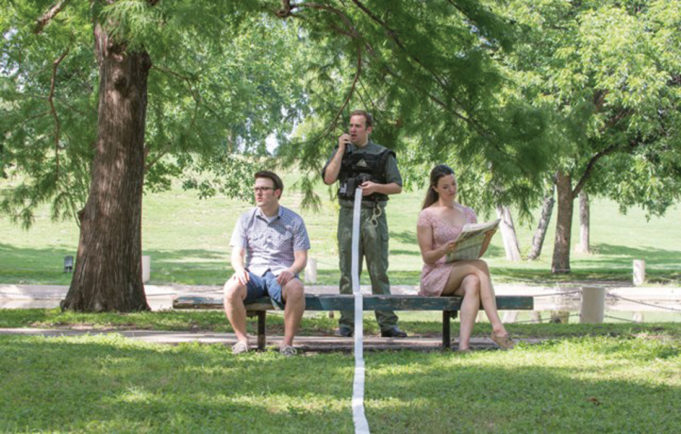This is not a play about Donald Trump’s wall, Brexit, or any government office involving a row of disgruntled, time-pressed people.
But it could be. In Crossing the Line, playwright Kieran Lynn roasts bureaucracy on a big stick for us to vicariously nibble away at in one rousing hour of comedic relief at Amphibian Stage Productions. Lynn, well loved for his dark absurdism, finds more levity than usual in this material. The script is stuffed to the seams with meaningless expressions made meaningful by director Melissa Crespo and a solid cast of familiar faces.
Originally released in 2012 as An Incident at the Border, Lynn’s comedy debuts in North Texas as Crossing the Line to deflate any blasphemous notions about our neighbors to the south. “In our context, it sounds like a Mexican-American conflict, which the play definitely isn’t,” said Scott Zenreich, Amphibian artistic associate. Not long before staging the play, the Phibs asked for Lynn’s permission to change the name. Lynn agreed, offering a few alternatives. The new title comes from a blazing dialogue among the characters, ping-ponging with good wordplay to expose the idiosyncrasies of idioms and lines drawn between nations.
The play begins in a quotidian park on an equally quotidian bench, where a young couple sits before a duck pond. The strong female lead, Olivia (Kelsey Milbourn), confesses her need to feel “more involved” and worldly while her less involved boyfriend, Arthur (Justin Lemieux), wonders on waterfowl. The couple can no longer wonder past each other, though, when abruptly interrupted by a piece of tape laid down by a lovable dope of a border guard named Reiver (Matthew Minor). As the bringer of this barrier, Reiver divides the couple, physically and internationally, without knowing how the division will exacerbate the longstanding emotional border between Olivia and Arthur. The couple protests. The border guard obeys order and eats fudge until Olivia can be withstood no more. She demands an explanation. Cue the never-ending chain of higher-ups, the conflict, and the clichéd drama.
The character arc of the border guard unfolds to show all of his most redeeming qualities and naiveté. As Reiver straddles the line between Arthur’s appreciation of unthinking conformity and Olivia’s need for individual power, he develops his own borderline personality struggle. To varying degrees, each character wrestles with the question: to be in control or to be a cog in a bureaucratic machine? Arthur’s character is very fair in his flatness. It’s easy to reimagine his character as a perfectly nice, twentysomething Fort Worthian raised in a good country club home with a perfect affinity for Banana Republic chino shorts. Order is obligatory. Empty expressions are comfortable. Olivia’s character delivers all the intensity opposite Arthur. At times, her Shakespearean she-villain temperament seems ill-suited for the light absurdist style of this piece. Considering that Milbourn may be best known for years of performances with the Trinity Shakespeare Festival, this comes as no shock. She possesses enough bravado to carry the role of a character representing individual power and freewill, but dialing back with a moment of vulnerability would have gone a long way.
In terms of overall character development, the border guard seems to be the most promising as he slinks in and out of favor with the other two characters throughout the play –– trying his hand at seduction, fraternal feeling, and fallacious argumentation. Yet in the end, the character who changes the most surprises most of the audience. Lynn colludes against expectations with a surprise ending, and Crespo’s delivery of that ending speaks to her quick finesse and artistry as a director.
If you’re familiar with The Zoo Story by Edward Albee or The Duck Variations by David Mamet, you’ll recognize the salience of one set piece: the bench. True to the style of “park bench plays,” this unassuming seat of power harbors great miscommunications more often than not. When the border divides this seat in two, Arthur is flung to flowering bushes on stage right, whereas Olivia and the border guard go clashing and thrashing through the weeping willow branches covering most of stage left. Neither duck nor duck pond materialize on the set but are oft-mentioned by Arthur, who desperately wants to live as a duck and whose character anchors the play in the intended genre.
With no shortage of quick quips, Crossing the Line zooms in with a not-so-subtle subtext on international politics, zooming out before things get too heated. This smart comedy found an equally smart cast to challenge in terms of comedic timing. The value of a well-placed pause wasn’t lost on these performers, but a few of the ripest jokes could have become memorable jabs if the pace of performance would have been slowed down slightly. Very apparent, though, is that most audience members can catch the deeper meanings steeped in most every line. Crossing the Line aims to please a wider audience of theatergoers, amateur philosophers and your run-of-the-mill word nerds by toeing the line of past park bench plays as much as it tip-toes over the line, too.
Jackie Hoermann-Elliott is a Fort Worth-based freelance writer. Follow her on Twitter or Instagram @jackiehoermann.












